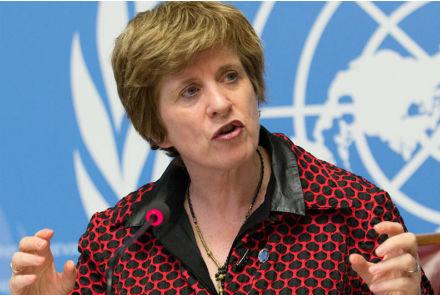The latest annual report on Afghanistan from the United Nations High Commissioner for Human Rights found that despite efforts to improve the situation in Afghanistan, human rights remains elusive for the people due to the ongoing conflict.
The report, from 1 January to 30 November 2017, was released on Wednesday in Geneva and provides an overview of the human rights work and technical assistance conducted by UNAMA in cooperation with the Office of the High Commissioner.
Focusing on five key areas, the report highlights five areas: protection of civilians in armed conflict; protection of children in armed conflict; elimination of violence against women, and increasing women’s participation in peace-building and security, and gender equality; prevention of torture and arbitrary detention; and the integration of human rights into peace and reconciliation processes.
Presenting the report in Geneva, United Nations Deputy High Commissioner for Human Rights Kate Gilmore said that despite positive developments and constructive initiatives led by the government, the enjoyment of human rights remains elusive for the people of Afghanistan.
“With Afghanistan serving on the Human Rights Council, OHCHR looks forward to further engaging with the government for the implementation of its voluntary commitments and pledges and of the recommendations presented in the report,” said Gilmore.
The UNHCR stated that in 2017, the overall deterioration in security and the lack of resources for public policies had an adverse impact on the situation of human rights.
“Civilian casualties remained high, and continued conflict and insecurity gave rise to further political and economic uncertainty. The prospects for the achievement of a sustainable peace therefore remained limited,” read the report.
The issue of women’s rights was also reason for concern. The report noted that although government took steps to increase respect for women’s rights, the actual participation of women in all spheres of life, including peace processes, remained low. Women also continued to suffer from various forms of violence and harassment.
In addition, the report noted the adoption of the new Penal Code opens a way towards the establishment of a progressive legal framework by criminalizing several harmful practices and introducing command responsibility; concerns remain, however, in particular since the removal of its provisions on violence against women.
“Civic space remained subject to enormous constraints. Civil society actors, including human rights defenders, specifically women human rights defenders and activists, and journalists faced threats, acts of intimidation and harassment and, at times, deadly attacks.”
The report also stated that while the decision of the Prosecutor of the International Criminal Court to move forward on the situation in Afghanistan may provide much needed accountability on major crimes, the few cases dated after 2003 on which the Court could investigate and possibly adjudicate may not be sufficient to satisfy the expectations of many Afghans for justice. “Complementary initiatives at the national level are therefore required.”
To read the full report CLICK HERE.


